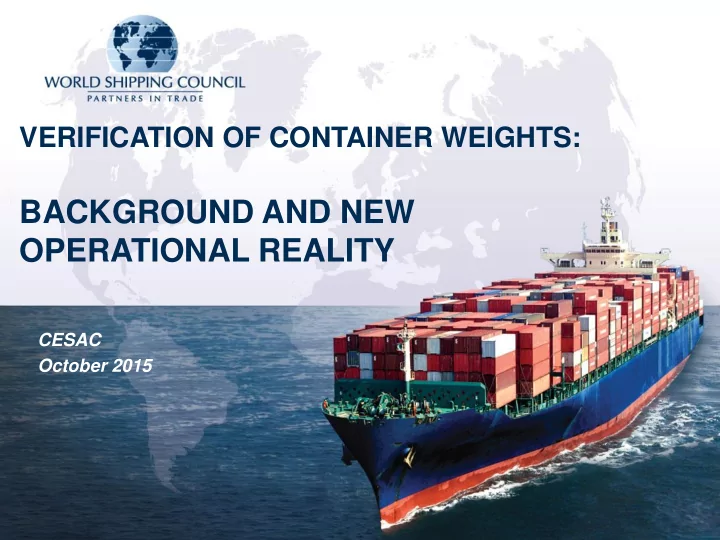

VERIFICATION OF CONTAINER WEIGHTS: BACKGROUND AND NEW OPERATIONAL REALITY CESAC October 2015
Background • Before 2014: SOLAS* Convention only required that prior to loading a shipper must: – Provide ship’s master or representative with the gross mass of the container. – “Ensure” the actual gross mass is in accordance with the declared gross mass. • No effective enforcement in most jurisdictions. • No IMO requirement to verify actual weights. *SOLAS is “Safety of Life at Sea”.
Magnitude of the problem (1) • Despite industry self-help efforts to reduce incidences of shippers providing incorrect container weights, the problem continues. • WSC Member lines’ experience: – The problem is significant and arises in almost every trade. – In some trades, it is rampant.
Magnitude of the problem (2) Official British investigation of the MSC Napoli structural failure incident (2007): • 20% of the containers on deck had actual weights that differed more than 3 tons from their declared weights. • The largest difference was 20 tons. • The total weight of the 20% misdeclared containers was 312 tons heavier than on the cargo manifest*. *The carrier’s cargo manifest states the gross mass as declared by the shipper in its shipping instructions to the carrier.
Magnitude of the problem (3) • Ukraine Customs weighed all containers over a two week period in October 2012 discharged in Ukrainian ports: 56% of the containers had an actual weight greater than the weight stated in the carrier’s cargo manifest. • Other Customs administrations have reported similar findings (e.g. Poland and India).
Magnitude of the problem (4) June 2011: Container ship Deneb in Algeciras For other examples of incidents involving misdeclared container weights, see IMO document: DSC17/INF.5
Consequences Misdeclared weights lead to: • Risk of personal injury or death to crew and shore side workers • Ship instability • Incorrect vessel stowage • Collapsed container stacks • Re-handling and re-stowing • Higher operating costs • Chassis and ship damage • Supply chain delay • Shut-out of accurately declared cargoes • Road safety problems
New SOLAS amendments: Basic Principles 1. Before a packed container can be loaded onto a ship, its weight must be determined through weighing. No exception to this requirement. 2. Two permissible methods for weighing: Method 1: Weigh the packed container. Method 2: Weigh the cargo and other contents and add tare weight of the container. 3. Estimating weight is not permitted. Shipper must weigh or arrange for weighing of packed container or its contents.
New SOLAS amendments: Basic Principles (continued) Shipper may rely on BCO’s or other forwarders’ 4. properly derived weights, using Method 1 or 2. 5. But -- shipper remains responsible for verified weight. Weighing equipment must meet national 6 . certification and calibration requirements. 7. Governments may apply enforcement tolerance limits. Does not relieve the shipper from obligation to provide verified weight obtained from weighing.
New SOLAS amendments: Basic Principles (continued) Carrier and terminals may rely on shipper’s 8. “signed” weight verification. “Signed” means: – Specific person representing shipper must be named and identified as having verified accuracy of weight; and, – Weight verification is to be provided as or be part of a shipping document (e.g. declaration including a weight ticket); and, – Shipping document can be electronic. 9. Vessel stow plans should use verified weights for all packed containers loaded on board.
New Operational Reality One: A verified weight is a condition for loading a packed container onto a ship. No Verified Weight No Load
New Operational Reality Two: The shipper is responsible for providing the verified weight. “Shipper” = Party identified on maritime carrier’s Bill of Lading
New Operational Reality Three: Lack of signed shipper weight verification can be remedied by weighing the packed container at port or elsewhere. Carriers and port terminals will need to agree on how such situations will be handled.
New Operational Reality Four: Government implementation Commercial parties need to understand and arrange for compliance with national requirements (e.g., certification and documentation.)
Time is running short SHIPPER CARRIER TERMINAL SUPPLY CHAIN PARTIES NEED TO TALK TO EACH OTHER NOW ABOUT: • OBTAINING • PROVIDING, • TRANSMITTING, • RECEIVING • USING PROPER VERIFIED CONTAINER WEIGHTS.
Thank you More information available at: http://www.worldshipping.org/industry- issues/safety/cargo-weight
Recommend
More recommend